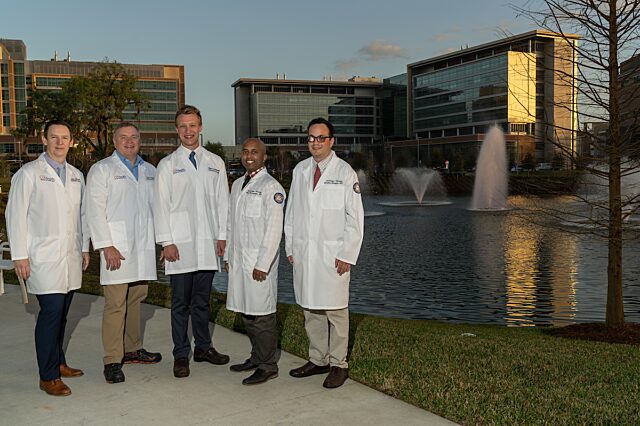Kidney Cancer Awareness Month: Multidisciplinary Care is the Key

March is National Kidney Cancer Awareness Month, so it’s a great time to put the spotlight on these amazing organs that act as a pair of janitors in many ways. They remove waste products and drugs from the body, while also balancing the body’s fluids, releasing hormones that regulate blood pressure and so much more. However, if one or both of this dynamic duo stops working, it can lead to major health problems.
Kidney cancer is among the 10 most common cancers for men and women. The American Cancer Society estimates that 81,800 new cases of kidney cancer will be diagnosed in 2023. While many of these cases tend to be in those over the age of 45 and occur more often for men, kidney cancer can affect anyone.
Because kidney cancer can occur for anyone and in varying levels of severity, it is crucial that treatment for kidney cancer is personalized for the patient. At UF Health, urologists, medical oncologists and radiation oncologists work together to develop individualized, multidisciplinary treatment plans for each patient’s circumstances based on age, general health, life expectancy and tumor characteristics.
“It is incredibly important for locally advanced and metastatic cancer patients to have access to multi-modal therapies. The way we sequence these treatments, we can tailor treatment designs to individual patients to optimize their cancer care and maintain or improve their quality of life. It is a massive focus of what we do at UF Health Urology,” said Padriac O’Malley, MD, MSc, FRCSC, assistant professor in the department of urology at the University of Florida College of Medicine.
For tumors that have not spread from the tissue or organ in which they originated, options may range from surgery, such as a radical or partial nephrectomy, to surveillance or thermal ablation. For advanced cancers, options may also include surgery or systemic therapy, such as immunotherapy or a combination approach. UF Health’s team approach to kidney cancer care also includes multidisciplinary surgical teams for patients who may have massively complex tumors that involve the liver or the heart. On the radiation oncology side, radiation strategies are being developed to act with the precision of a surgeon’s knife without the invasiveness of surgery.
“We are extremely fortunate to have experts in all areas of kidney cancer treatment at UF Health,” said Li-Ming Su, MD, chair of the department of urology.
The Faces of Kidney Cancer
Jessica
Jessica was only 32 when stage 1 kidney cancer was discovered on a CT scan. After minimally invasive “keyhole” surgery, called a robotic partial nephrectomy, was performed by Su, the small mass was removed. Today, she is cured of cancer and has normal kidney function.
Bill
At age 56, Bill felt a nagging back pain he thought was a kidney stone and noticed blood in his urine. After seeing O’Malley, he learned he had a Stage 3, locally advanced tumor that extended into his main renal vein. Fortunately, the cancer seemed to have not spread elsewhere in his body. Knowing that this type of kidney cancer had a significant risk of reoccurrence, after surgery to remove the mass, Bill benefitted from UF Health experts in multiple disciplines as he received immunotherapy treatment. This treatment worked well for more than 1½ years, but the cancer recently returned. This time, Bill was treated with specialized radiation therapy called stereotactic body radiation therapy, or SBRT, by Robert Zlotecki, MD, PhD, professor and medical director in the department of radiation oncology. SBRT uses 3D imaging to aim high doses of radiation at the affected area, which means there is little damage to surrounding healthy tissue.
Bob
Robert, 61, presented with a very small, 1.1-centimeter lesion on his kidney. It was Stage 1 and found incidentally during a CT of his abdomen that was performed for a separate reason. O’Malley said that there were many options for this patient in terms of treatment. O’Malley underwent cryoablation, which uses extreme cold to destroy the tumor and is performed under local anesthesia as an outpatient procedure. Two years later, Robert is doing great and has had no further problems.
These three patients had varying degrees of kidney cancer, but because of UF Health’s unique approach to care that involves multiple modalities of treatment across departments, they were treated in the least invasive and most innovative and effective ways possible. Visit UFHealth.org/kidneycancer to learn more about kidney cancer care at UF Health.
About the author
